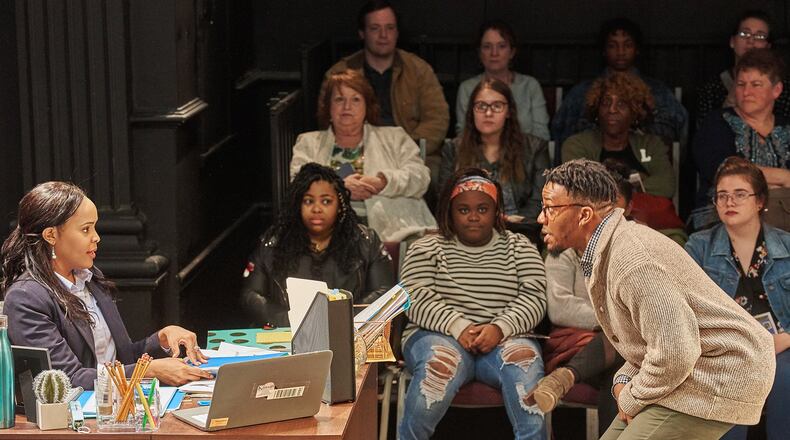My mother worked for the Department of Family & Children Services for 30 years, and one of my earliest memories is of her and my dad getting up in the wee hours of the morning to look for a child who had run away from a foster home. This happened numerous times throughout my childhood, along with napping on the floor of the DFCS office in my Barbie sleeping bag, seeing other little girls in my old winter coats and going to the mall to buy a new electronic device in order to uphold mom’s end of a bargain with a teenager whose parents were on drugs, incarcerated or both.
My realization that not everyone is born into loving families came at an early age, and as a consequence, so did my sense of compassion. It is especially true of social workers that work always finds its way home.
Penni (Brittany L. Smith) and Nate (Seun Soyemi) are no exception to this rule, and over the past four years, the two have bonded over long office hours, trying to juggle child welfare cases that never seem to close. They have always been on the same side of right, but when it comes to a 7-year-old boy named Ontario and his addict mother, Leandra, they find themselves at odds.
Penni believes that Ontario should be removed from his mother's custody, and Nate wants to see the family stay together. When Nate steals the case file off Penni's desk, dominoes fall that change both of their lives forever in the world premiere of Darren Canady's "Ontario Was Here" at Aurora Theatre.
RELATED | What’s coming to Atlanta stages in the next few months?
The show marks the directorial debut for Cynthia D. Barker, whom audiences last saw on the Aurora stage in "The Mountaintop," as the maid who ushers the Rev. Martin Luther King Jr. to the other side. Canady is a favorite playwright of many Atlanta theaters: His play "False Creeds" won the Alliance Theatre's 2006 Kendeda Graduate Playwriting Award, and his show "Right On" was produced at Horizon Theatre in 2014.
In this new two-person play, Canady dissects what it means to be too close for comfort in every possible way, which is the play’s strength and weakness. He does a nice job of establishing the “work spouse” relationship between the two characters and then gradually flips it upside down in a way that is soap opera levels of juicy. In that same vein, so many complications are introduced — their office is under an audit, Penni and Nate dated in the past, Penni’s marriage is on life support, Nate has gotten too close to the case — and the play becomes dense. And there are a number of soliloquies in the play where the actors address the audience, and they are supposed to speak simultaneously, but these moments sometimes take away from the gravitas of the dialogue.
Barker, at the helm, does a nice job of bringing clarity to all of this information and making the script digestible. She plays up the humor in Canady’s work, making this a quick, but still engaging, 90 minutes. Smith and Soyemi seem at home in their characters and match each other’s ferocity with sincerity and perfectly timed punchlines. The audience is seated on three sides of the stage, and the actors use every bit of the space, even when referencing characters that never appear onstage, including their supervisor Joanna, Ontario and his mother.
The set looks like a typical office, consisting of greenish-gray carpet, two desks piled high with folders, filing cabinets and a busted radiator. Barker and set designer Daniella Ampudia play with moving the office walls in order to change scenes, but this just makes the transitions appear cumbersome. Luckily, this is helped by lighting designer Maximo Grano de Oro and sound designer Andrew Cleveland, whose bright lights and hip-hop beats keep the audience jamming between scenes.
On the surface, this is a play about a child welfare case gone wrong, but what starts to bubble up is a story about class and the power struggle between men and women in the workplace. When Nate takes Ontario’s case file off Penni’s desk, he not only violates their code of ethics, but he also asserts his opinion as being above hers. He refers to her as bourgeois and out of touch because of her Ivy League education, and she is often defending her identity and trying to win his affection at the same time. The script doesn’t delve too deeply here, but it definitely approaches it.
A sign on the wall of the set reads, “There are no office hours for leaders,” but Nate and Penni could benefit from boundaries. As they say in an aside, “this beast called social work will eat your soul.” But, if not them, who? With more than 400,000 children in foster care in the U.S., someone has to speak for them, and this play advocates for the people who carry their interests home with them every day.
RELATED | To combat shortage, new state budget gives big boost to foster parents
THEATER REVIEW
“Ontario Was Here”
Through March 4. Tickets start at $15 for students and $20 for general admission. Aurora Theatre, 128 E. Pike St., Lawrenceville. 678-226-6222, auroratheatre.com.
Bottom line: This new play gives insight into an often-overlooked profession.
IN OTHER THEATER NEWS:
About the Author
Keep Reading
The Latest
Featured



